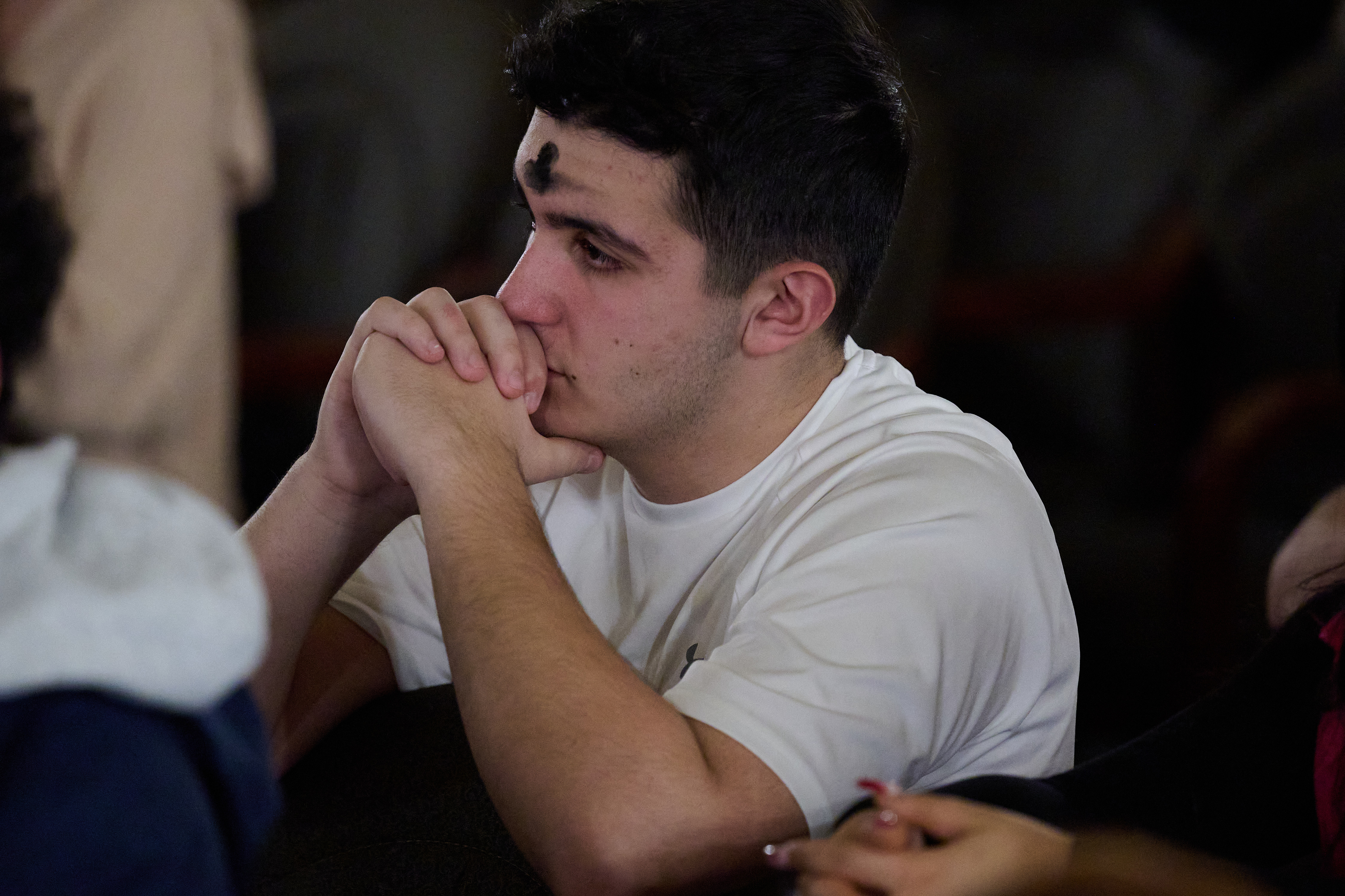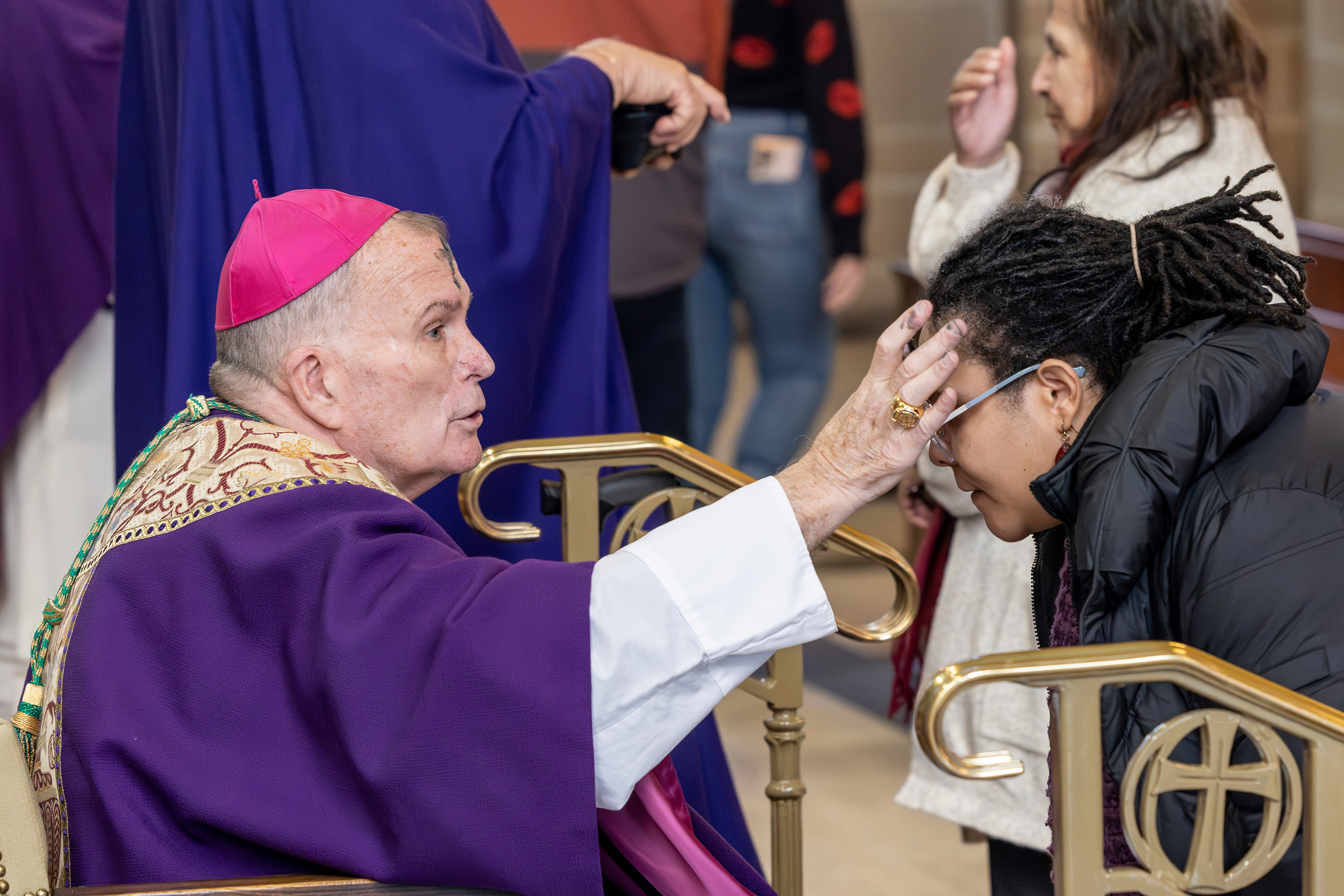UPDATE: Bishop urges communities to make Lenten observances simple, real
February 15, 2024 at 8:20 a.m.

 Bishop O'Connell celebrates Mass on Ash Wednesday in St. Mary of the Assumption Cathedral, Trenton. Hal Brown photo
Bishop O'Connell celebrates Mass on Ash Wednesday in St. Mary of the Assumption Cathedral, Trenton. Hal Brown photo
As Christians throughout the world marked the beginning of Lent on Ash Wednesday, Feb. 14, Bishop David M. O’Connell, C.M., urged Catholics to remember that Lent is a time for heartfelt repentance, change of heart and conversion.
PHOTO GALLERY:Ash Wednesday Mass in Monmouth University
PHOTO GALLERY: Ash Wednesday Mass in St. Mary of the Assumption Cathedral
“And God’s mercy is the real motivation and the only reward. Taking the ashes today is an admission from your heart that you are willing to try to change what needs to change in your life on the path to conversion, to Easter,” Bishop O’Connell said to the hundreds gathered in St. Mary of the Assumption Cathedral, Trenton, and to the standing-room-only crowd of Monmouth University students in West Long Branch later in the day.
In his homily, Bishop O’Connell spoke of how ashes are an ancient symbol, both cultural and biblical, for showing grief. In the Old Testament, he said, there are many occasions when ashes were used for that purpose, and the various books all contain descriptions of ashes being used to show sorrow.
In Christian traditions, including the Gospels of Matthew and Luke and the writings of the Early Church Fathers, ashes were referred to as a sign of penance and repentance for sins, Bishop O’Connell said.
 A Monmouth University student prays during Ash Wednesday Mass. Mike Ehrmann photo
A Monmouth University student prays during Ash Wednesday Mass. Mike Ehrmann photo
The practice of placing ashes on the heads of sinners as a liturgical symbol marking the beginning of Lent, the Church’s period of penance, became commonplace in the Catholic Church by the 10th century, and Pope Urban II ritualized the custom in 1091.
Bishop O’Connell urged the two congregations to keep in mind the three pillars of Lent — prayer, fasting and almsgiving.
“Fast and abstain when the Church requires it. Give something up to make room for God and his mercy to fill you,” he said.
For prayer, the Bishop asked the people to “Pray more and pray deeply and wherever you can, because God listens to you.
“God wants to hear about your lives,” he said.
“Make it a practice to spend more time in prayer and do good for someone else,” he said. And most of all, “Don’t make it complicated like New Year’s resolutions.”
“Keep your practices simple and real for these next 40 days.”
Patrick Meehan, a senior history major at Monmouth and member of Holy Innocents Parish, Neptune, said he was “overwhelmed with joy” with Bishop O’Connell’s Ash Wednesday visit, given the Bishop’s recent health challenges.
“He is an example of perseverance to all of us, what it means to carry his cross every day,” Meehan said.
Cristina D’Averso-Collins, Monmouth University’s Catholic campus minister, spoke of the “great blessing” it was to have Bishop O’Connell celebrate Mass for the students. She said there are many opportunities planned for students to grow in their faith during Lent, including a Lenten Holy Hour, a retreat and the showing of the film, “The Passion of the Christ.”
D’Averso-Collins admitted she finds Lent to be a “beautiful, yet challenging season.”
 Bishop O'Connell imposes ashes on the forehead of a congregant in St. Mary of the Assumption Cathedral, Trenton. Hal Brown photo
Bishop O'Connell imposes ashes on the forehead of a congregant in St. Mary of the Assumption Cathedral, Trenton. Hal Brown photo
“This year, I will focus on living in Lent as a family, with my husband and children, and making small sacrifices where possible,” she said.
“I am also being challenged to offer up the daily sacrifices of motherhood which are abundant,” D’Averso-Collins said with a smile, then noted how heartened she was to hear the Bishop caution against making too many “resolutions.”
Gene Zita, a Third Degree member of the Knights of Columbus who attends Mass in various parishes, and Marianne Benkert of St. Raphael-Holy Angels Parish, Hamilton, said they found it meaningful to begin their Lenten journeys by attending Ash Wednesday Mass with Bishop O’Connell in the diocesan Cathedral.
“To me the Season of Lent means renewal, a chance to change and become better, and it’s also a time to repent and heal,” Benkert said, sharing that she plans to attend weekly Stations of the Cross and participate in Eucharistic Revival groups.
“I am very grateful for Our Lord’s sacrifice on the Cross and all his blessings,” she said.
Zita said part of his Lenten journey would be spent in prayer in an Adoration Chapel.
“This is a wonderful way to honor and thank him for everything he has done for us and continues to do for us each day,” Zita said. “Lent is another gift from Our Lord, who teaches us that suffering and sacrifice are very important for the purification and growth of our souls. It prepares and strengthens us for life’s daily struggles and eternal life.”
Related Stories
Sunday, December 14, 2025
E-Editions
Events
 Bishop O'Connell celebrates Mass on Ash Wednesday in St. Mary of the Assumption Cathedral, Trenton. Hal Brown photo
Bishop O'Connell celebrates Mass on Ash Wednesday in St. Mary of the Assumption Cathedral, Trenton. Hal Brown photo
As Christians throughout the world marked the beginning of Lent on Ash Wednesday, Feb. 14, Bishop David M. O’Connell, C.M., urged Catholics to remember that Lent is a time for heartfelt repentance, change of heart and conversion.
PHOTO GALLERY:Ash Wednesday Mass in Monmouth University
PHOTO GALLERY: Ash Wednesday Mass in St. Mary of the Assumption Cathedral
“And God’s mercy is the real motivation and the only reward. Taking the ashes today is an admission from your heart that you are willing to try to change what needs to change in your life on the path to conversion, to Easter,” Bishop O’Connell said to the hundreds gathered in St. Mary of the Assumption Cathedral, Trenton, and to the standing-room-only crowd of Monmouth University students in West Long Branch later in the day.
In his homily, Bishop O’Connell spoke of how ashes are an ancient symbol, both cultural and biblical, for showing grief. In the Old Testament, he said, there are many occasions when ashes were used for that purpose, and the various books all contain descriptions of ashes being used to show sorrow.
In Christian traditions, including the Gospels of Matthew and Luke and the writings of the Early Church Fathers, ashes were referred to as a sign of penance and repentance for sins, Bishop O’Connell said.
 A Monmouth University student prays during Ash Wednesday Mass. Mike Ehrmann photo
A Monmouth University student prays during Ash Wednesday Mass. Mike Ehrmann photo
The practice of placing ashes on the heads of sinners as a liturgical symbol marking the beginning of Lent, the Church’s period of penance, became commonplace in the Catholic Church by the 10th century, and Pope Urban II ritualized the custom in 1091.
Bishop O’Connell urged the two congregations to keep in mind the three pillars of Lent — prayer, fasting and almsgiving.
“Fast and abstain when the Church requires it. Give something up to make room for God and his mercy to fill you,” he said.
For prayer, the Bishop asked the people to “Pray more and pray deeply and wherever you can, because God listens to you.
“God wants to hear about your lives,” he said.
“Make it a practice to spend more time in prayer and do good for someone else,” he said. And most of all, “Don’t make it complicated like New Year’s resolutions.”
“Keep your practices simple and real for these next 40 days.”
Patrick Meehan, a senior history major at Monmouth and member of Holy Innocents Parish, Neptune, said he was “overwhelmed with joy” with Bishop O’Connell’s Ash Wednesday visit, given the Bishop’s recent health challenges.
“He is an example of perseverance to all of us, what it means to carry his cross every day,” Meehan said.
Cristina D’Averso-Collins, Monmouth University’s Catholic campus minister, spoke of the “great blessing” it was to have Bishop O’Connell celebrate Mass for the students. She said there are many opportunities planned for students to grow in their faith during Lent, including a Lenten Holy Hour, a retreat and the showing of the film, “The Passion of the Christ.”
D’Averso-Collins admitted she finds Lent to be a “beautiful, yet challenging season.”
 Bishop O'Connell imposes ashes on the forehead of a congregant in St. Mary of the Assumption Cathedral, Trenton. Hal Brown photo
Bishop O'Connell imposes ashes on the forehead of a congregant in St. Mary of the Assumption Cathedral, Trenton. Hal Brown photo
“This year, I will focus on living in Lent as a family, with my husband and children, and making small sacrifices where possible,” she said.
“I am also being challenged to offer up the daily sacrifices of motherhood which are abundant,” D’Averso-Collins said with a smile, then noted how heartened she was to hear the Bishop caution against making too many “resolutions.”
Gene Zita, a Third Degree member of the Knights of Columbus who attends Mass in various parishes, and Marianne Benkert of St. Raphael-Holy Angels Parish, Hamilton, said they found it meaningful to begin their Lenten journeys by attending Ash Wednesday Mass with Bishop O’Connell in the diocesan Cathedral.
“To me the Season of Lent means renewal, a chance to change and become better, and it’s also a time to repent and heal,” Benkert said, sharing that she plans to attend weekly Stations of the Cross and participate in Eucharistic Revival groups.
“I am very grateful for Our Lord’s sacrifice on the Cross and all his blessings,” she said.
Zita said part of his Lenten journey would be spent in prayer in an Adoration Chapel.
“This is a wonderful way to honor and thank him for everything he has done for us and continues to do for us each day,” Zita said. “Lent is another gift from Our Lord, who teaches us that suffering and sacrifice are very important for the purification and growth of our souls. It prepares and strengthens us for life’s daily struggles and eternal life.”










